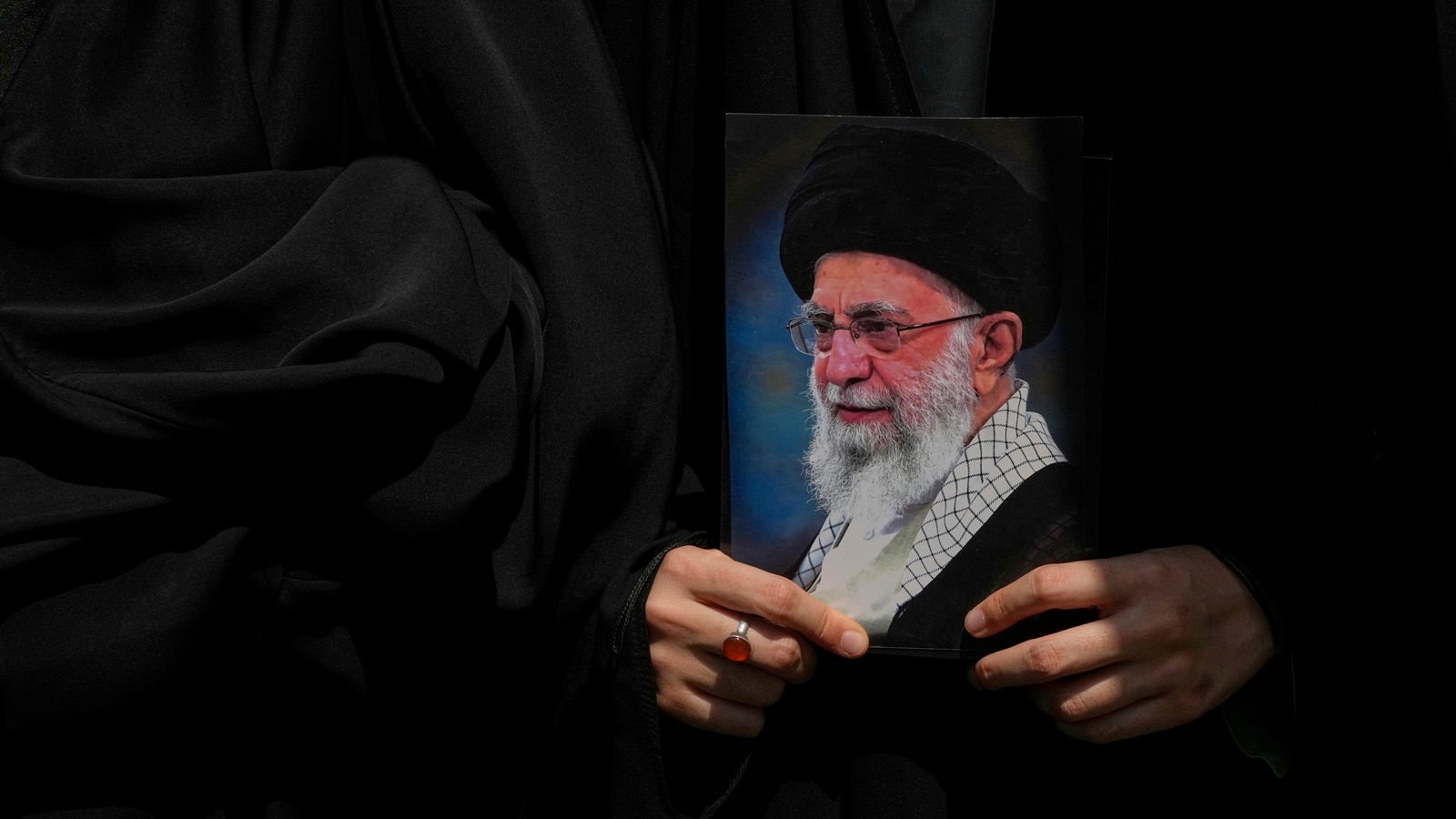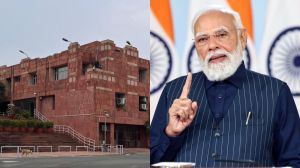Stay updated with the latest - Click here to follow us on Instagram
Assassination fear looming, Iran’s Supreme Leader names likely successors
Ayatollah Ali Khamenei, Iran-Israel conflict update: Khamenei, 86, is aware that either Israel or the US could try to kill him. The officials said he sees this as martyrdom.
 Ayatollah Ali Khamenei News: An protester holds a poster of the Iranian Supreme Leader Ayatollah Ali Khamenei during a protest to condemn Israeli attacks on multiple cities across Iran, after Friday prayers ceremony in Tehran, Iran. (AP)
Ayatollah Ali Khamenei News: An protester holds a poster of the Iranian Supreme Leader Ayatollah Ali Khamenei during a protest to condemn Israeli attacks on multiple cities across Iran, after Friday prayers ceremony in Tehran, Iran. (AP)Iran-Israel conflict update: Iran’s Supreme Leader, Ayatollah Ali Khamenei, has mostly stopped using electronic communications to speak with his commanders, relying instead on a trusted aide to deliver messages, The New York Times reported on Saturday. Three Iranian officials familiar with his emergency plans said this is to make it harder for enemies to locate him.
The officials said Ayatollah Khamenei is in a bunker and has chosen replacements along his military chain of command in case more senior figures are killed. He has also named three senior clerics as candidates to take over as supreme leader if he is killed.
 Ayatollah Ali Khamenei News: This photo released on Wednesday, June 18, 2025, by the official website of the office of the Iranian supreme leader, shows Supreme Leader Ayatollah Ali Khamenei in a televised speech, under a portrait of the late revolutionary founder Ayatollah Khomeini. (AP)
Ayatollah Ali Khamenei News: This photo released on Wednesday, June 18, 2025, by the official website of the office of the Iranian supreme leader, shows Supreme Leader Ayatollah Ali Khamenei in a televised speech, under a portrait of the late revolutionary founder Ayatollah Khomeini. (AP)
According to The New York Times, this shows how serious the situation is for Khamenei and his rule, which began more than 30 years ago. He has taken these steps after Israel launched attacks on Iran last week.
Israeli strikes are the largest Iran has faced since its war with Iraq in the 1980s. Tehran has suffered more damage from these strikes in a few days than during the eight-year war with Iraq, officials said.
Iran has begun daily counterstrikes, targeting places such as a hospital and an oil refinery in Haifa, as well as religious buildings and homes in Israel.
The Iranian officials said the leadership is preparing for different outcomes, including whether US President Donald Trump will decide to join the war. The officials spoke anonymously as they were not allowed to speak publicly about Khamenei’s plans.
Khamenei, 86, is aware that either Israel or the US could try to kill him. The officials said he sees this as martyrdom. He has told the Assembly of Experts, the group responsible for choosing the next supreme leader, to pick a successor quickly from the three names he provided if he is killed. Normally, this process can take months.
“The top priority is the preservation of the state,” Vali Nasr, a professor at Johns Hopkins University, told The New York Times. “It is all calculative and pragmatic.”
The supreme leader holds wide powers in Iran, leading the military, judiciary, legislature and executive. The officials said that his son, Mojtaba, is not among the candidates, nor is former president Ibrahim Raisi, who died in a helicopter crash in 2024.
Since the war began, Khamenei has appeared in two recorded video messages. In one, he said, “The people of Iran will stand against a forced war.”
The attacks on Iran have hit military bases, nuclear sites and energy infrastructure. Hundreds of people have been killed, including top commanders, and many civilians have died.
Iran’s leadership also fears infiltration by Israeli agents. Mahdi Mohammadi, an adviser to the parliament speaker, said in an audio recording shared with The New York Times, “It is clear that we had a massive security and intelligence breach; there is no denying this.”
The Ministry of Intelligence has ordered officials to stop using phones or other electronic devices. Senior leaders have been told to stay underground. Iran has also restricted the internet and blocked international calls.
Ali Ahmadinia, a spokesman for President Masoud Pezeshkian, said, “We are safeguarding the security of our country by shutting down the internet.”
Iran’s Supreme National Security Council has warned that anyone working with the enemy must surrender by Sunday or face execution.
Tehran is largely empty, with checkpoints set up across the city. Mohammad Ali Abtahi, a reformist politician, said, “The war has softened the divisions we had, both among each other and with the general public.”
Many Iranians, including government critics, have expressed support for the country in the face of the attacks. Narges Mohammadi, a Nobel Peace Prize winner, told the BBC, “Democracy cannot come through violence and war.”
- 01
- 02
- 03
- 04
- 05































